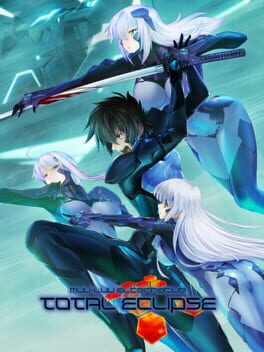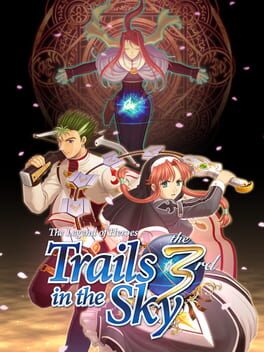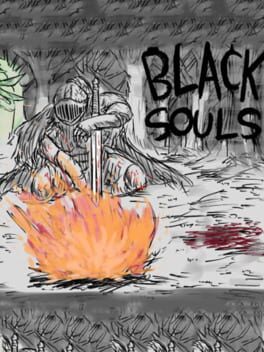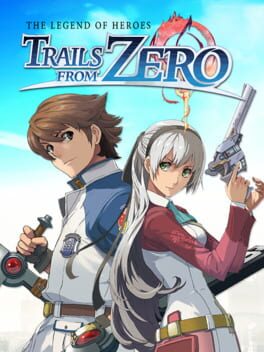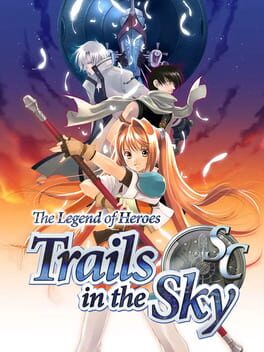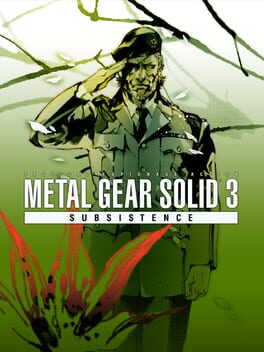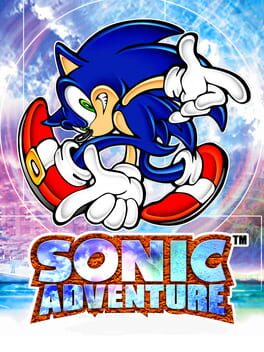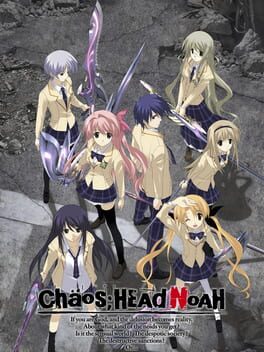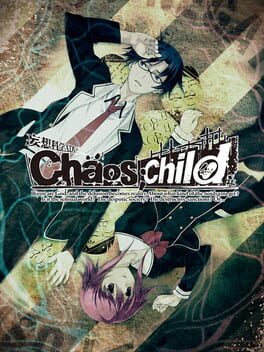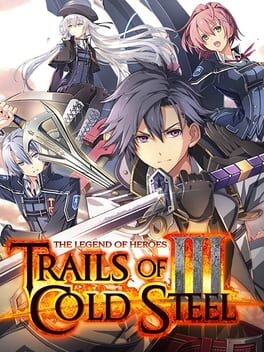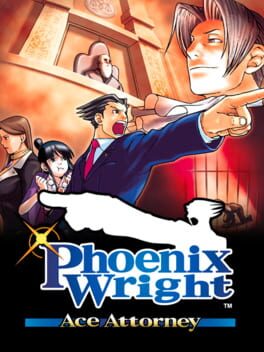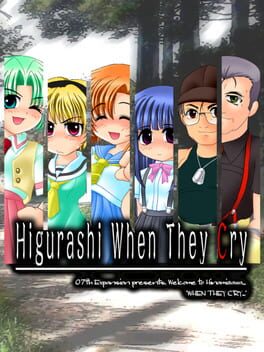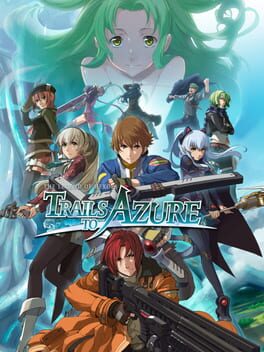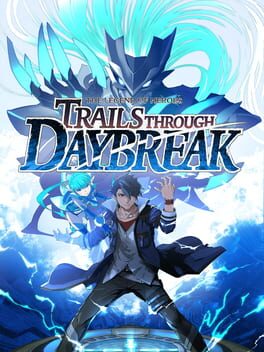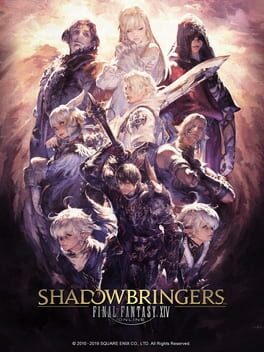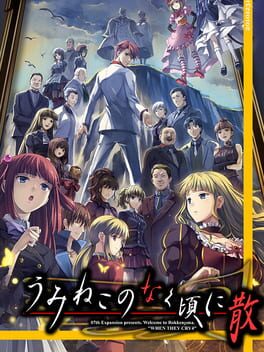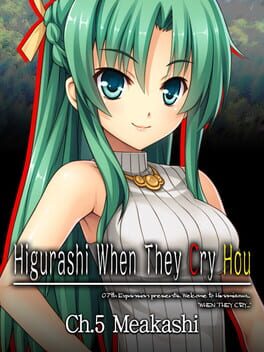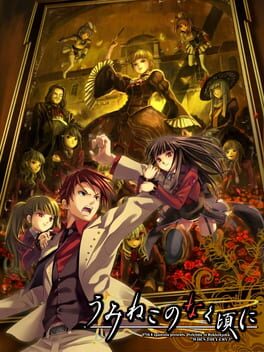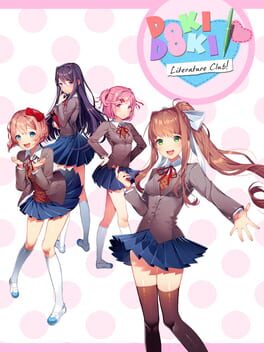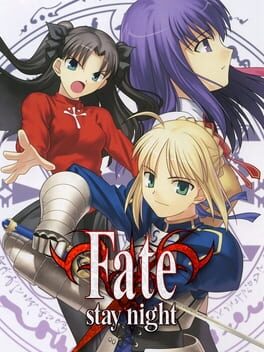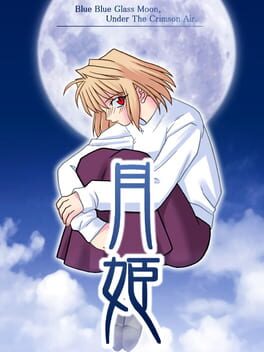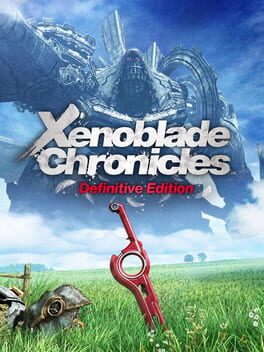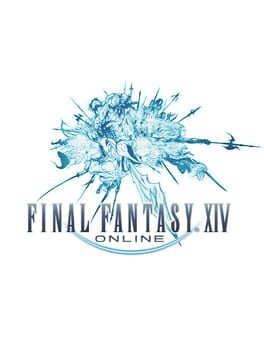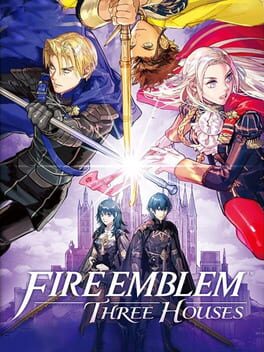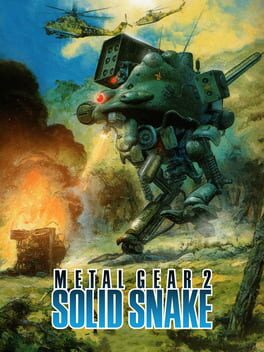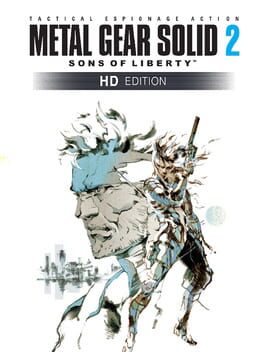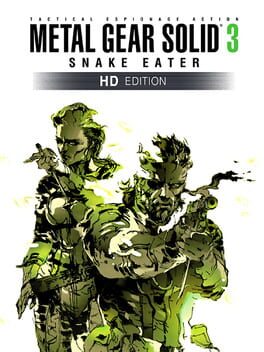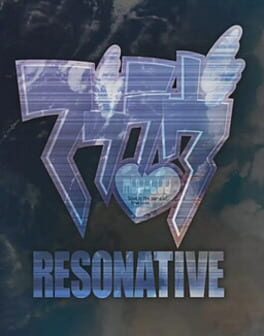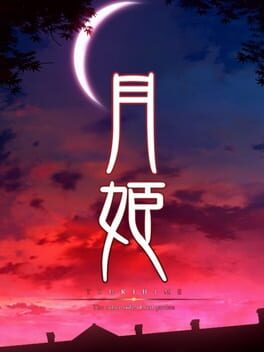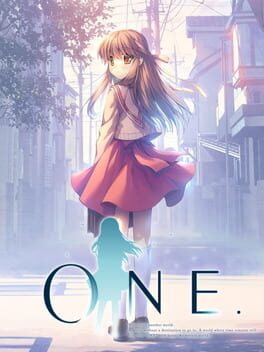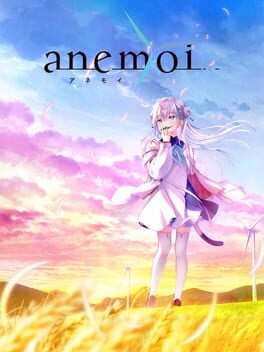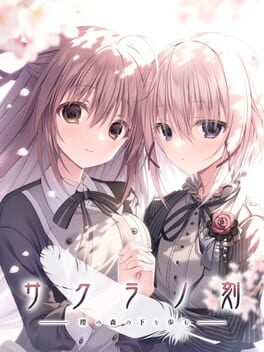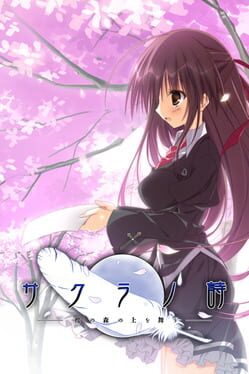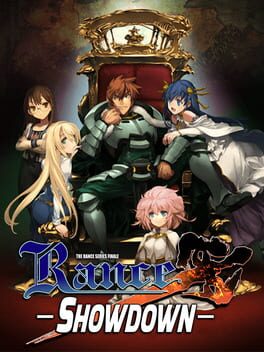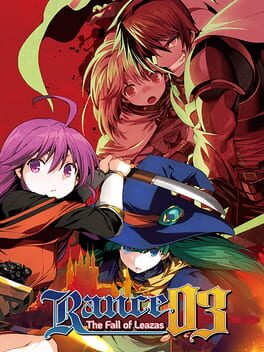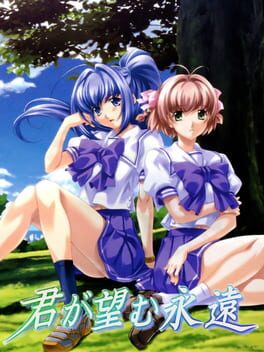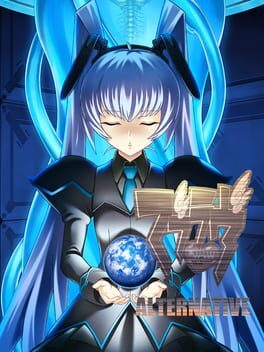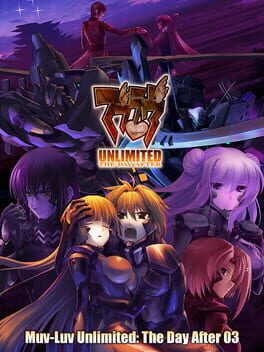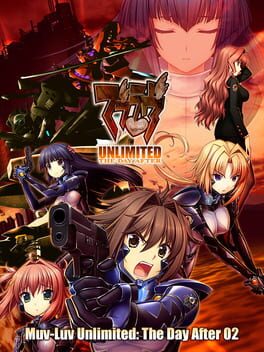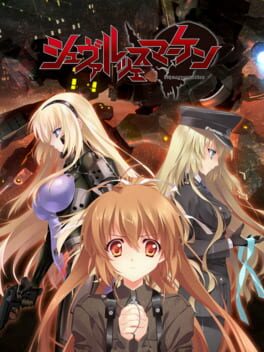Nano20
130 reviews liked by Nano20
Yuuya, Yui and Cryska are parallels of the same type of people, however with different nationalities who need to learn to connect with others despite their differences, whether ethnic, personal or moral. Not just let go of the identities imposed on them and start living as human beings with their own individualities, but understand that it is possible for humans to connect and work together despite everything. Instead of pushing our ideas on others, learn and be considerate of others so that in this conflict of ideas we find a path that leads us to mutual understanding. The purpose of TE is to demonstrate that despite all our differences, human beings can work together despite all obstacles.
After having to deal with the production and writing of TDA after Alternative, I am immensely grateful to see Yoshimune back on the series as a writer and dedicating a lot of time to production, direction, etc. Its amazing. Look, MLA is WAY better than TE, especially cuz it continues to be Yoshimune's life's work, so some may find it strange that I give the same score to both. But I have to follow my heart , this VN is spectacular and even though the level of emotion isn't the same as MLA, it still manages to play with your heart.
In general MLA > TE > TDA = Extra/Unlimited
After having to deal with the production and writing of TDA after Alternative, I am immensely grateful to see Yoshimune back on the series as a writer and dedicating a lot of time to production, direction, etc. Its amazing. Look, MLA is WAY better than TE, especially cuz it continues to be Yoshimune's life's work, so some may find it strange that I give the same score to both. But I have to follow my heart , this VN is spectacular and even though the level of emotion isn't the same as MLA, it still manages to play with your heart.
In general MLA > TE > TDA = Extra/Unlimited
This review contains spoilers
I hate this game. I am hating so hard on this game right now. I am confused why they made a trails game, which is a series known for having a lot of story, which has little story. This is a game where you go through the exact same dungeons you did in the last 2 games for 40 hours. Chapter 5's final boss can suck the fattest cock known to man kind, I hate getting petrified and then having to back out, put on the petrify immunity accesories and then do it again. Chapter 6 is like 15 hours long and filled with endless walking through empty dungeons from the last game. Chapter 7 started with me walking aimlessly then the game just decided that its time to proceed when I didn't do anything. I also clipped into the ground in chapter 7 because I was using fast forward and lost a lot of progress so be careful with that. Chapter 8 pulls a FF6 and makes you use all your party members, so have fun leveling and getting new equipment for literally every character.
The door mechanic is a lazy way to implement story that doesn't actually matter. I am not here to play a VN, this is a jrpg. Its like they gave up on trying to balance the story and gameplay and just said "fuck it, do it yourself". I personally don't care for these cutscenes, I don't need more character development in this game, I already have 100+ hours invested in these characters.
The characters trying to ship Agate and Tita together is absolutely fucking disgusting. Tita is a child and Agate is a grown adult, and Anelace, one of the other characters says that the age gap is nothing to their love. Ew, gross, I can put the Estelle and Joshua love thing aside because they aren't blood related and it's also just weird shit they do over in Japan that you get used to if you've watched enough anime. I didn't talk about this in my SC review but it's also gross how Agate uses Tita as a substitute for his dead little sister. His arc would've been a lot better if it was about him learning to cope with his loss and not just finding a new sister replacement.
I think Kevin's arc is interesting but I think Falcom struggles with displaying emotions through writing. I feel like they tackle these issues on a very surface level without getting too deep into. I don't know what they are afraid of, but they failed both times with Joshua and Kevin at making me feel anything for these characters. Like yea, Kevin feels like he should go to hell, and then literally goes to hell, but it falls flat, it doesn't truly express the despair Kevin is feeling to the player, or at least me personally.
Otherwise, in terms of story content, I struggle to understand how any of this is important. This is a fanservice game, they get all the characters together, write about whatever random bullshit they did between SC and 3rd and put them in doors, and repeat dungeons from the previous games. I just find FC the best, everything is new, every character doesn't hang out with you like they do in SC because like real people, they got stuff to do. The character dynamic between Estelle and Joshua was great, and fleshing out the world was great. SC gave me the impression they were gonna dig deep and make true on the promising writing of FC but then they just wrote shounen slop. Then 3rd is a nothing burger for fans, and 15% new content. At this point, I just want to get to crossbell. The combat system is stale with nothing new, the story is irrelevant and non-existant, the soundtrack is probably the weakest, and environments are painfully generic. My expectations are now in the gutter and I expect nothing from crossbell.
FC really did feel refreshing to play too. The combat system was weird but different and fleshed out thoughtout that one unlike SC and 3rd where it stagnates. The main character was a WOMAN. That never happened back when this was made, AND she is properly fleshed out. Olivier is bisexual??? Maybe, I am uncertain about this but he says a lot of things that made me think so. It was so different from the FF games where you play as a blond guy with his short black hair girl friend to kill god. FC did not end with killing god. I pray that the future games can capture some of those feelings I felt during FC and sharpen them.
The door mechanic is a lazy way to implement story that doesn't actually matter. I am not here to play a VN, this is a jrpg. Its like they gave up on trying to balance the story and gameplay and just said "fuck it, do it yourself". I personally don't care for these cutscenes, I don't need more character development in this game, I already have 100+ hours invested in these characters.
The characters trying to ship Agate and Tita together is absolutely fucking disgusting. Tita is a child and Agate is a grown adult, and Anelace, one of the other characters says that the age gap is nothing to their love. Ew, gross, I can put the Estelle and Joshua love thing aside because they aren't blood related and it's also just weird shit they do over in Japan that you get used to if you've watched enough anime. I didn't talk about this in my SC review but it's also gross how Agate uses Tita as a substitute for his dead little sister. His arc would've been a lot better if it was about him learning to cope with his loss and not just finding a new sister replacement.
I think Kevin's arc is interesting but I think Falcom struggles with displaying emotions through writing. I feel like they tackle these issues on a very surface level without getting too deep into. I don't know what they are afraid of, but they failed both times with Joshua and Kevin at making me feel anything for these characters. Like yea, Kevin feels like he should go to hell, and then literally goes to hell, but it falls flat, it doesn't truly express the despair Kevin is feeling to the player, or at least me personally.
Otherwise, in terms of story content, I struggle to understand how any of this is important. This is a fanservice game, they get all the characters together, write about whatever random bullshit they did between SC and 3rd and put them in doors, and repeat dungeons from the previous games. I just find FC the best, everything is new, every character doesn't hang out with you like they do in SC because like real people, they got stuff to do. The character dynamic between Estelle and Joshua was great, and fleshing out the world was great. SC gave me the impression they were gonna dig deep and make true on the promising writing of FC but then they just wrote shounen slop. Then 3rd is a nothing burger for fans, and 15% new content. At this point, I just want to get to crossbell. The combat system is stale with nothing new, the story is irrelevant and non-existant, the soundtrack is probably the weakest, and environments are painfully generic. My expectations are now in the gutter and I expect nothing from crossbell.
FC really did feel refreshing to play too. The combat system was weird but different and fleshed out thoughtout that one unlike SC and 3rd where it stagnates. The main character was a WOMAN. That never happened back when this was made, AND she is properly fleshed out. Olivier is bisexual??? Maybe, I am uncertain about this but he says a lot of things that made me think so. It was so different from the FF games where you play as a blond guy with his short black hair girl friend to kill god. FC did not end with killing god. I pray that the future games can capture some of those feelings I felt during FC and sharpen them.
BLACK SOULS
TBD
I had a feeling this was going to amaze me in some way but damn I was not expecting some of those moments, especially Star Door 15.
Trails in the Sky the 3rd is a significant improvement compared to FC and SC, primarily because of how well-written the Protagonist is in this game. Kevin Graham is a really interesting character about whom I was inquisitive by the end of SC and he didn't disappoint at all.
Ries the female Protagonist is also really fleshed out and has a strong dynamic with Kevin that makes the pair work (unlike Estelle and Joshua).
Most of the other characters were just returning from previous games with very little to offer and the side stories didn't make them any better for me as I already don't like those characters and one backstory isn't enough for me to suddenly start liking them (except some).
Another fact I noticed in this game was how good Estelle and Joshua are as a supporting cast. I liked Estelle and Joshua here a lot more than I liked them in FC and SC. I am now excited for how their roles are gonna play out in the next couple of entries.
Still, I've got my issues with the game, the first half of the game can be very boring as very little is going on other than Kevin's backstory at the beginning of each chapter which keeps me intrigued to know what's to come. But the chapters themselves are not very well done until the second half of the game.
Also, this is supposed to be a Love Letter for the Liberl arc, while also wrapping the remaining plot points left after SC, but it's hard to enjoy this since I never really got into the characters in the first two games so another miss for me.
Another problem might be a personal one, but I'm not a fan of the dungeon crawler aspect of this game, it got boring real quick and I just didn't enjoy much of my playthrough because of that.
Finally, Trails delivered something that I had expecting from the series since the very first game. And while it took its sweet time, if they are gonna continue with this level of character writing and well-done backstories, then I am really interested in what's to come from the later games. Hopefully, they don't disappoint me as the First two games did.
Trails in the Sky the 3rd is a significant improvement compared to FC and SC, primarily because of how well-written the Protagonist is in this game. Kevin Graham is a really interesting character about whom I was inquisitive by the end of SC and he didn't disappoint at all.
Ries the female Protagonist is also really fleshed out and has a strong dynamic with Kevin that makes the pair work (unlike Estelle and Joshua).
Most of the other characters were just returning from previous games with very little to offer and the side stories didn't make them any better for me as I already don't like those characters and one backstory isn't enough for me to suddenly start liking them (except some).
Another fact I noticed in this game was how good Estelle and Joshua are as a supporting cast. I liked Estelle and Joshua here a lot more than I liked them in FC and SC. I am now excited for how their roles are gonna play out in the next couple of entries.
Still, I've got my issues with the game, the first half of the game can be very boring as very little is going on other than Kevin's backstory at the beginning of each chapter which keeps me intrigued to know what's to come. But the chapters themselves are not very well done until the second half of the game.
Also, this is supposed to be a Love Letter for the Liberl arc, while also wrapping the remaining plot points left after SC, but it's hard to enjoy this since I never really got into the characters in the first two games so another miss for me.
Another problem might be a personal one, but I'm not a fan of the dungeon crawler aspect of this game, it got boring real quick and I just didn't enjoy much of my playthrough because of that.
Finally, Trails delivered something that I had expecting from the series since the very first game. And while it took its sweet time, if they are gonna continue with this level of character writing and well-done backstories, then I am really interested in what's to come from the later games. Hopefully, they don't disappoint me as the First two games did.
Title: Final Fantasy VII Rebirth: A Masterful Continuation of an Iconic Legacy
As a lifelong fan of the Final Fantasy series, experiencing the magnificence of Final Fantasy VII Rebirth was an emotional journey unlike any other. Serving as a direct sequel to the acclaimed Final Fantasy VII Remake, this installment not only honors the beloved classic but also charts a bold new course, expanding upon its rich lore and characters in ways that are both awe-inspiring and deeply resonant.
From the moment I stepped back into the dystopian city of Midgar, I was enveloped in a world brimming with wonder and danger. The attention to detail in the environment design is nothing short of breathtaking, with each location meticulously crafted to evoke a sense of nostalgia while introducing fresh elements that keep the experience feeling vibrant and alive. Whether I was navigating the labyrinthine streets of Sector 7 or scaling the towering plateaus of the Shinra Headquarters, every corner of the world felt meticulously realized and ripe for exploration.
One of the most striking aspects of Final Fantasy VII Rebirth is its narrative depth and complexity. Building upon the foundation laid by its predecessor, the sequel delves deeper into the intricate web of politics, spirituality, and personal vendettas that define the world of Gaia. The story unfolds with a sense of urgency and gravitas, weaving together the destinies of its diverse cast of characters in a tapestry of epic proportions. Moments of heart-wrenching tragedy are juxtaposed with scenes of triumphant heroism, creating a narrative arc that is as emotionally resonant as it is captivating.
Moreover, Final Fantasy VII Rebirth introduces a host of new gameplay mechanics and features that elevate the experience to new heights. The revamped combat system seamlessly blends real-time action with strategic decision-making, allowing for dynamic battles that are as exhilarating as they are tactical. The inclusion of new playable characters and summonable allies adds depth to the party dynamics, offering players a wealth of options for customizing their playstyle and overcoming formidable foes.
In addition to its engrossing single-player campaign, Final Fantasy VII Rebirth also delivers an immersive multiplayer experience that allows players to join forces with friends and strangers alike in epic battles against powerful adversaries. Whether teaming up to tackle challenging dungeons or competing in intense PvP matches, the multiplayer component adds a new layer of social interaction and replayability to the game, ensuring that the adventure never truly ends.
Overall, Final Fantasy VII Rebirth stands as a testament to the enduring legacy of one of gaming's most iconic franchises. With its breathtaking visuals, emotionally resonant storytelling, and engaging gameplay, it represents the pinnacle of what a modern RPG can achieve. Whether you're a longtime fan of the series or a newcomer eager to embark on an unforgettable journey, Final Fantasy VII Rebirth is an absolute triumph that demands to be experienced.
As a lifelong fan of the Final Fantasy series, experiencing the magnificence of Final Fantasy VII Rebirth was an emotional journey unlike any other. Serving as a direct sequel to the acclaimed Final Fantasy VII Remake, this installment not only honors the beloved classic but also charts a bold new course, expanding upon its rich lore and characters in ways that are both awe-inspiring and deeply resonant.
From the moment I stepped back into the dystopian city of Midgar, I was enveloped in a world brimming with wonder and danger. The attention to detail in the environment design is nothing short of breathtaking, with each location meticulously crafted to evoke a sense of nostalgia while introducing fresh elements that keep the experience feeling vibrant and alive. Whether I was navigating the labyrinthine streets of Sector 7 or scaling the towering plateaus of the Shinra Headquarters, every corner of the world felt meticulously realized and ripe for exploration.
One of the most striking aspects of Final Fantasy VII Rebirth is its narrative depth and complexity. Building upon the foundation laid by its predecessor, the sequel delves deeper into the intricate web of politics, spirituality, and personal vendettas that define the world of Gaia. The story unfolds with a sense of urgency and gravitas, weaving together the destinies of its diverse cast of characters in a tapestry of epic proportions. Moments of heart-wrenching tragedy are juxtaposed with scenes of triumphant heroism, creating a narrative arc that is as emotionally resonant as it is captivating.
Moreover, Final Fantasy VII Rebirth introduces a host of new gameplay mechanics and features that elevate the experience to new heights. The revamped combat system seamlessly blends real-time action with strategic decision-making, allowing for dynamic battles that are as exhilarating as they are tactical. The inclusion of new playable characters and summonable allies adds depth to the party dynamics, offering players a wealth of options for customizing their playstyle and overcoming formidable foes.
In addition to its engrossing single-player campaign, Final Fantasy VII Rebirth also delivers an immersive multiplayer experience that allows players to join forces with friends and strangers alike in epic battles against powerful adversaries. Whether teaming up to tackle challenging dungeons or competing in intense PvP matches, the multiplayer component adds a new layer of social interaction and replayability to the game, ensuring that the adventure never truly ends.
Overall, Final Fantasy VII Rebirth stands as a testament to the enduring legacy of one of gaming's most iconic franchises. With its breathtaking visuals, emotionally resonant storytelling, and engaging gameplay, it represents the pinnacle of what a modern RPG can achieve. Whether you're a longtime fan of the series or a newcomer eager to embark on an unforgettable journey, Final Fantasy VII Rebirth is an absolute triumph that demands to be experienced.
This review contains spoilers
A while ago I made a pretty negative (at least compared to the Western consensus on the work) review of Umineko. This work has certainly made an impact on my life, with Ange's struggle being relatable in ways that I am not comfortable sharing, but suffice to say that this is the single most relatable work I've experienced to date, for better or for worse. My view of Umineko is completely reliant on my whims to the point that I wouldn't be surprised if whether I think it's good or bad depends on what side of the bed I woke up that morning. Numerical ratings are far from a holistic metric of how someone views a work, but it has ranged in scores anywhere from 2/10 to 10/10, changing frequently. I've tried giving it a neutral 5 or left it unrated, but even that felt off. I have never had a work I was so conflicted on live rent-free in my mind. So you can view this as another view of my "heart", so to speak. Without love it cannot be seen, different perspectives of the same person can be valid at the same time. I will leave this review and the old one up. It just feels right that way. Now let's dive in.
And Then There Were None by Agatha Christie is one of my favourites books. It sparked my interest in the mystery genre, and made the now cliche setting of a rich group of people being invited to a mansion on an island that gets caught up in a storm and cut off from civilisation a favourite, for sure. Umineko really has an interesting spin on it with how it revolves around a Japanese family with Western names, and how the island leaving no certain clues of what actually happened leads to any sorts of interpretations. The "magic system" largely revolves around walking concepts taking form as objects or entities. The author and heartless truth are concepts turned into characters that walk around and interact with the cast from what seems to be an entirely different genre. The mish-mash of genres is a constant since the ending of episode 1, and it's glorious to see how Beatrice and Battler spectate how the pieces behave through the 4th dimension, and how the soundtrack (which is absolutely top-tier, I don't know what they were smoking, but I'll be having some of that) encompasses a variety of genres, to the point of having techno-dubstep-whatever playing over characters arguing in a mansion ripped straight from ATTWN, or what is essentially Touhou music during magic fights. And I just LOVE the concept of the red/blue truths and will forever miss them in other mystery/death game media where they often just do a basic trial or something instead.
Umineko does so many things from so many different genres that it's easier to say what it isn't rather than what it is. I will say, though, the common sentiment of "if you call Umineko a mystery, you missed the point!" isn't really on the money in my opinion, and I don't think it's a view Ryukishi would support. Umineko is often called "a battle of anti-mystery and anti-fantasy", mystery is in the name. People aren't machines, and detectives are people. Who knows what sort of previously unseen evidence the detective overlooked? Who knows what happened on an island with no known survivors and no remaining evidence? The circumstances are so bizarre that it wouldn't be surprising if magical creatures descended onto the island at only that point in time, and before and after. All that is left to speculate, and that's why it's important to try to look at it from any possible point of view. Only then will we get close to MAYBE seeing the unattainable "what actually happened". Part of the point is that it is using that mystery to make the characters and readers try to reach the "heart" of the matter, to see it with love and not just treat it like a game. There are real people with many sides to them in all walks of life, even characters in mystery novels. All sorts of people get affected — culprits, such as Beatrice, whose life tipped the dominos that led to the tragedy; victims, such as Battler, who died and what was left behind was a new personality in the form of Tohya that complete disassociated from the disaster; those left behind, such as Ange, whose entire lives revolve around a single event. In a way, a "deconstruction" of the mystery genre with an uncertain solution is one of the best ways to explore such themes, because it demonstrates that anyone can be good and evil, victim or culprit, in various situations. We are all walking catboxes, even we aren't sure what is actually going on a lot of the time. Eva and Rosa can be abusers or victims of similar abuse themselves perpetuating the cycle, you often don't get the full story no matter how hard you try.
Despite my complaints about Erika and Bernkastel seemingly further enabling the sentiment that all mystery except rare exceptions like Umineko is a cold "puzzle mystery" where the detective walks in BBC Sherlock-style, solves the puzzle because they don't care about human suffering, and then walk out, the feelings of those affected be damned, they really do add a lot to the narrative. Erika is the antithesis of what Ryukishi wants someone with love to do. It's not that you have to stop thinking entirely, it's that you have to see the "love" and various sides of things. You can be so far gone in your attempt to try to logic everything out that you end up seeing a very shallow, and often incorrect, worldview. And that is one potential path that Ange could take, a life of obsession, chasing something she can never obtain. Someone so deeply buried in this hole that they won't climb out of that they reject any potential for future growth and happiness over something they have no control over.
In my view, there are three Uminekos. The first Umineko was something you had to be there for — the ambitious 8-part story with months and years between episodes which had people online in both East and West speculate about what could possibly happen, and the following frustrated reception, from which Ryukishi never truly recovered from. The second Umineko is the bingeable, complete 8 visual novel episodes that most readers who review it on this website complete. Finally, there is the manga, in which Ryukishi makes changes (for better or for worse, depending on who you ask) to the original vision. To be honest, I find it regrettable how often the view of "the VN doesn't answer anything, if you actually want an answer read the manga!" is. It Say what you want about Ryukishi's dry prose or higher-than-thou conceit (boy do we know I have a lot to say about that), but the original vision for Umineko is a work of passion, passion that you will rarely find elsewhere. It was a saga spanning years of author/audience interaction, with all sorts of possible theories and views coming up. It was a work so unapologetically dedicated to showing the "without love it cannot be seen" theme that it went as far as to call out people who don't think for themselves. Rarely will you meet an author who gives as much of a shit as Ryukishi.
And actually, the worst thing you can do is get mad at Ryukishi for you not being able to solve it. The hints are all there, especially in episode 7, they aren't talking about some random maid named Yasu and various other things like Shannon being in the same room for no reason. But that's just life, you can't expect to figure everything out. I've read plenty of things where I didn't fully get everything but I never once blamed the author. And actually, you don't need to be able to have a valid solutions for things like Yasu's identity, episode-specific murders, or the freakin' epitaph. You don't even need to put that much time into it. It's certainly nice if you do that and especially if you figure those things out, but it's not necessary. What's important is that you try.
The readers that Ryukishi is not happy with are those that don't try. Let me clarify that I think the Umineko manga has its merits, such as with the art and Yasu's Confession, and I am glad that people are finding out about Umineko through it and enjoying it. However I think that the years of unjust hate after episode 8's original release got to Ryukishi, and so despite writing "his own version of the story that doesn't disrupt the catbox at all, it's just another view" (which no one listens to btw, it's frequently accepted as the "canon version of the story"), it gave the "goats" what they wanted. Yasu's Confession is the antithesis to what Will did in episode 7 — solving the core of the mystery in a respectful manner, with "love" for the culprit. In a vacuum it is a cool backstory, elaborating on things that are left ambiguous or more vague in a manner more preferable for some readers, but in return for this and Bernkastel being far more specific with her words at the end of the episode, a large part of what made Umineko special gets damaged, because getting told "okay, here's what ACTUALLY happened" in a story where not knowing the "objective truth" is contrary to that work's vision. And Yasu didn't want this kind of reveal, and that reveal was done in episode 7 anyway. Episode 8 is Ange's conclusion, really. Yet the manga rips the guts out of the mystery in as much detail as possible when it was never the point. Yes, the backstory is well-written, but I don't think it fits within the grander picture of what Umineko was originally striving to be.
What makes someone a "loveless" reader isn't trying to solve the mystery, it isn't wanting a different ending or themes, and it most certainly isn't being anti-escapist vs. the story easily being interpreted as an escapist one. Umineko is a work that encourages thinking from beginning to end. What actually makes someone a loveless goat is not trying to see... with love. It's being a "media consumer" that's looking for the next talked about "peak fiction" that just wants an answer and to move on without any regard for the characters and what they're going through and the themes of the story. It's the people who want another "puzzle mystery" where the sole purpose for many readers is to see murders happen and find the culprit. It's not one's fault for not figuring out absolutely everything in Umineko without outside help, but it is possible, and in any case I don't find it acceptable to blame the author for it.
And it is a mystery, at least in part. Mysteries that deal with a "catbox" situation where many solutions fit the bill have existed since at least the middle of the 20th century. Japan has had shinhonkaku — new generation Japanese mystery that breaks the tropes that classical mystery has overused like a broken record. Umineko is not the first, and it certainly won't be the last to try to see things with "love" even in the Japanese mystery catalogue alone. Any work that claims to be the end-all and be-all of a genre or whatever is very questionable by default. Mysteries that don't just involve being solved like a logical puzzle by a misanthropic detective are in abundance, too — plenty of mysteries all around the globe, especially those made in modern times care about the feelings of culprits and victims and how they affect those around them. That's not what really matters here, either, though — what makes Umineko so noteworthy is how it combines so many of these genres, themes, inspirations, aesthetics, musical styles and mixes them to deliver this core message. It is a story that tries to be so many things, released and constantly affected by the two-sided interaction between author and reader. It's honestly really hard to apply "the death of the author" to this where only the product matters in a vacuum, it's just not how it was made. Episode 3 ended up being different from the original vision due to Episode 2's audience reception, for example.
It's not just murder mystery casts that should live by the idea of "without love it cannot be seen" (within reason, I mean narcissists and psychopaths exist and the healthy approach with those is cutting contact, but moderation being key goes for anything in life). It is all of us. The people we meet and grow apart with, the ones we feel apathy or disgust for and the ones we love, everyone involved has not a singular story, but multiple stories to tell. Even they themselves rarely know that. In a way you don't really need 150+ hours on average to deliver such a relatively simple idea, but when it works, it really works.
So there you have it. Another possible view at the catbox that is my opinion on Umineko. It's very possible that tomorrow I'll wake up and think that it is awful. I feel like it's fitting that someone who has been on both sides of the spectrum write both highly negative and highly positive reviews on this work. Either way, I'm sure I won't stop thinking about Umineko for a long time.
And Then There Were None by Agatha Christie is one of my favourites books. It sparked my interest in the mystery genre, and made the now cliche setting of a rich group of people being invited to a mansion on an island that gets caught up in a storm and cut off from civilisation a favourite, for sure. Umineko really has an interesting spin on it with how it revolves around a Japanese family with Western names, and how the island leaving no certain clues of what actually happened leads to any sorts of interpretations. The "magic system" largely revolves around walking concepts taking form as objects or entities. The author and heartless truth are concepts turned into characters that walk around and interact with the cast from what seems to be an entirely different genre. The mish-mash of genres is a constant since the ending of episode 1, and it's glorious to see how Beatrice and Battler spectate how the pieces behave through the 4th dimension, and how the soundtrack (which is absolutely top-tier, I don't know what they were smoking, but I'll be having some of that) encompasses a variety of genres, to the point of having techno-dubstep-whatever playing over characters arguing in a mansion ripped straight from ATTWN, or what is essentially Touhou music during magic fights. And I just LOVE the concept of the red/blue truths and will forever miss them in other mystery/death game media where they often just do a basic trial or something instead.
Umineko does so many things from so many different genres that it's easier to say what it isn't rather than what it is. I will say, though, the common sentiment of "if you call Umineko a mystery, you missed the point!" isn't really on the money in my opinion, and I don't think it's a view Ryukishi would support. Umineko is often called "a battle of anti-mystery and anti-fantasy", mystery is in the name. People aren't machines, and detectives are people. Who knows what sort of previously unseen evidence the detective overlooked? Who knows what happened on an island with no known survivors and no remaining evidence? The circumstances are so bizarre that it wouldn't be surprising if magical creatures descended onto the island at only that point in time, and before and after. All that is left to speculate, and that's why it's important to try to look at it from any possible point of view. Only then will we get close to MAYBE seeing the unattainable "what actually happened". Part of the point is that it is using that mystery to make the characters and readers try to reach the "heart" of the matter, to see it with love and not just treat it like a game. There are real people with many sides to them in all walks of life, even characters in mystery novels. All sorts of people get affected — culprits, such as Beatrice, whose life tipped the dominos that led to the tragedy; victims, such as Battler, who died and what was left behind was a new personality in the form of Tohya that complete disassociated from the disaster; those left behind, such as Ange, whose entire lives revolve around a single event. In a way, a "deconstruction" of the mystery genre with an uncertain solution is one of the best ways to explore such themes, because it demonstrates that anyone can be good and evil, victim or culprit, in various situations. We are all walking catboxes, even we aren't sure what is actually going on a lot of the time. Eva and Rosa can be abusers or victims of similar abuse themselves perpetuating the cycle, you often don't get the full story no matter how hard you try.
Despite my complaints about Erika and Bernkastel seemingly further enabling the sentiment that all mystery except rare exceptions like Umineko is a cold "puzzle mystery" where the detective walks in BBC Sherlock-style, solves the puzzle because they don't care about human suffering, and then walk out, the feelings of those affected be damned, they really do add a lot to the narrative. Erika is the antithesis of what Ryukishi wants someone with love to do. It's not that you have to stop thinking entirely, it's that you have to see the "love" and various sides of things. You can be so far gone in your attempt to try to logic everything out that you end up seeing a very shallow, and often incorrect, worldview. And that is one potential path that Ange could take, a life of obsession, chasing something she can never obtain. Someone so deeply buried in this hole that they won't climb out of that they reject any potential for future growth and happiness over something they have no control over.
In my view, there are three Uminekos. The first Umineko was something you had to be there for — the ambitious 8-part story with months and years between episodes which had people online in both East and West speculate about what could possibly happen, and the following frustrated reception, from which Ryukishi never truly recovered from. The second Umineko is the bingeable, complete 8 visual novel episodes that most readers who review it on this website complete. Finally, there is the manga, in which Ryukishi makes changes (for better or for worse, depending on who you ask) to the original vision. To be honest, I find it regrettable how often the view of "the VN doesn't answer anything, if you actually want an answer read the manga!" is. It Say what you want about Ryukishi's dry prose or higher-than-thou conceit (boy do we know I have a lot to say about that), but the original vision for Umineko is a work of passion, passion that you will rarely find elsewhere. It was a saga spanning years of author/audience interaction, with all sorts of possible theories and views coming up. It was a work so unapologetically dedicated to showing the "without love it cannot be seen" theme that it went as far as to call out people who don't think for themselves. Rarely will you meet an author who gives as much of a shit as Ryukishi.
And actually, the worst thing you can do is get mad at Ryukishi for you not being able to solve it. The hints are all there, especially in episode 7, they aren't talking about some random maid named Yasu and various other things like Shannon being in the same room for no reason. But that's just life, you can't expect to figure everything out. I've read plenty of things where I didn't fully get everything but I never once blamed the author. And actually, you don't need to be able to have a valid solutions for things like Yasu's identity, episode-specific murders, or the freakin' epitaph. You don't even need to put that much time into it. It's certainly nice if you do that and especially if you figure those things out, but it's not necessary. What's important is that you try.
The readers that Ryukishi is not happy with are those that don't try. Let me clarify that I think the Umineko manga has its merits, such as with the art and Yasu's Confession, and I am glad that people are finding out about Umineko through it and enjoying it. However I think that the years of unjust hate after episode 8's original release got to Ryukishi, and so despite writing "his own version of the story that doesn't disrupt the catbox at all, it's just another view" (which no one listens to btw, it's frequently accepted as the "canon version of the story"), it gave the "goats" what they wanted. Yasu's Confession is the antithesis to what Will did in episode 7 — solving the core of the mystery in a respectful manner, with "love" for the culprit. In a vacuum it is a cool backstory, elaborating on things that are left ambiguous or more vague in a manner more preferable for some readers, but in return for this and Bernkastel being far more specific with her words at the end of the episode, a large part of what made Umineko special gets damaged, because getting told "okay, here's what ACTUALLY happened" in a story where not knowing the "objective truth" is contrary to that work's vision. And Yasu didn't want this kind of reveal, and that reveal was done in episode 7 anyway. Episode 8 is Ange's conclusion, really. Yet the manga rips the guts out of the mystery in as much detail as possible when it was never the point. Yes, the backstory is well-written, but I don't think it fits within the grander picture of what Umineko was originally striving to be.
What makes someone a "loveless" reader isn't trying to solve the mystery, it isn't wanting a different ending or themes, and it most certainly isn't being anti-escapist vs. the story easily being interpreted as an escapist one. Umineko is a work that encourages thinking from beginning to end. What actually makes someone a loveless goat is not trying to see... with love. It's being a "media consumer" that's looking for the next talked about "peak fiction" that just wants an answer and to move on without any regard for the characters and what they're going through and the themes of the story. It's the people who want another "puzzle mystery" where the sole purpose for many readers is to see murders happen and find the culprit. It's not one's fault for not figuring out absolutely everything in Umineko without outside help, but it is possible, and in any case I don't find it acceptable to blame the author for it.
And it is a mystery, at least in part. Mysteries that deal with a "catbox" situation where many solutions fit the bill have existed since at least the middle of the 20th century. Japan has had shinhonkaku — new generation Japanese mystery that breaks the tropes that classical mystery has overused like a broken record. Umineko is not the first, and it certainly won't be the last to try to see things with "love" even in the Japanese mystery catalogue alone. Any work that claims to be the end-all and be-all of a genre or whatever is very questionable by default. Mysteries that don't just involve being solved like a logical puzzle by a misanthropic detective are in abundance, too — plenty of mysteries all around the globe, especially those made in modern times care about the feelings of culprits and victims and how they affect those around them. That's not what really matters here, either, though — what makes Umineko so noteworthy is how it combines so many of these genres, themes, inspirations, aesthetics, musical styles and mixes them to deliver this core message. It is a story that tries to be so many things, released and constantly affected by the two-sided interaction between author and reader. It's honestly really hard to apply "the death of the author" to this where only the product matters in a vacuum, it's just not how it was made. Episode 3 ended up being different from the original vision due to Episode 2's audience reception, for example.
It's not just murder mystery casts that should live by the idea of "without love it cannot be seen" (within reason, I mean narcissists and psychopaths exist and the healthy approach with those is cutting contact, but moderation being key goes for anything in life). It is all of us. The people we meet and grow apart with, the ones we feel apathy or disgust for and the ones we love, everyone involved has not a singular story, but multiple stories to tell. Even they themselves rarely know that. In a way you don't really need 150+ hours on average to deliver such a relatively simple idea, but when it works, it really works.
So there you have it. Another possible view at the catbox that is my opinion on Umineko. It's very possible that tomorrow I'll wake up and think that it is awful. I feel like it's fitting that someone who has been on both sides of the spectrum write both highly negative and highly positive reviews on this work. Either way, I'm sure I won't stop thinking about Umineko for a long time.
This review contains spoilers
They are lying to you, this game is not peak, but it is good. I do admire how ambitious this, and FC are, you can tell they tried to make a great game here with a minuscule budget. How they tried to stretch this budget out though made it worse. Trails SC suffers from some of the worst pacing I may have ever seen in a video game story. Chapter 8 has all this crazy shit happen and then they make you do a round trip around the city's you've been too. It's some of the most boring nothing content. In this game there's about 30-35% of a great game, and the rest of it is horrible. So much could've been cut out. I also dislike the character arcs for Agate and the rest of the side characters. The whole point of the first game was to make us invested in these characters, it should've been done in the first, not here. It really sucks too, because the first game was relatively down to earth, the stakes weren't too high, and a lot of it was spent establishing the world. SC devolves into THE most predictable and awful anime drivel, but it does retain its strong character writing. The villains suck ass and do the Vegeta thing that happens all the time in anime where they end up being good at the end. The first time Estelle meets Weissman on the ship, he is quite literally playing a giant organ. Like, it is straight up comical at times. The game also does not handle heavy topics well. The explanation of what happened to Joshua as a kid is not adequate enough to make me feel anything or really understand the repercussions this had. I think Estelles development to being more mature is cool, but when the game starts saying she's like the sun and she bring everyone together, it feels like it minimalizes her development. The start of SC is spent with Estelle learning to be strong on her own, and then the game just forgets that part and just says she is bright like the sun. It also infuriates me how the main cast formulaic the game is. Like 5 of the chapters is doing boring shit to meet an ouroboros member, who then kicks your ass then leaves. It never occurs to the main party that they need to get stronger to beat them and then they somehow do at the end??? It's more of an issue too, because the game has this thing where how strong you are in game is roughly how strong that character is in the story. For example, when Zane joins the party. he is obviously higher level than everyone else, because Zane would beat the dogshit out of Estelle or Schera. But Schera is also higher level than Estelle but not more than Zane. When Joshua joins, he is the highest level so far because he used to be part of ouroboros. When the bandit girl joins your party, she is lower level and doesn't even have a s-craft. I could keep going on to prove this point. There's no in-story explanation of how they got stronger, it's through gameplay, but it's confusing story wise because a lot of players won't even notice this fact.
Gameplay wise, it is identical EXCEPT for the new addition of chains. Chains are fucking terrible, and I have no clue why you would ever use these dog shit moves. It ruins your turn order, barely does more damage than if everyone involved just attacked normally, and costs craft points from everyone. They are awful and the only new addition sucks ass. Combat is mostly fine though. The boss fights are fun with a few exceptions, and the random encounters are ass. It takes too long for fights to finish for it to be structured like a SRPG. Luckily, you don't really need to grind. I do wish it did the FF13 and made every party members level the same. The late game boss fights are fucking awful though. The 2nd Renne fight, she hit her super immediately and crit and insta killed my whole party before I could even realize what happened. Loewe's fight is ass, and luckily you can just skip it for some reason??? A lot of the late game fights just have you spamming earth wall and aoe magic attacks. Also, Estelle is like the shittiest character. Her stats are fucking awful, and I could never make here as good as any other party member.
Overall, though, it is just the first game, but the story is worst. The game could not meet up to expectations and its writing is better when it isn't trying to make some secret organization kingdom hearts storyline. Its wasted so much of its time on backtracking and character arcs that should've happened in the first. The payoff is not worth 100 hours of gameplay. To put it in perspective, I have almost the same time in these two games as Persona 5. I am going to play the future entries though and I hope they improve on the formula established here.
Gameplay wise, it is identical EXCEPT for the new addition of chains. Chains are fucking terrible, and I have no clue why you would ever use these dog shit moves. It ruins your turn order, barely does more damage than if everyone involved just attacked normally, and costs craft points from everyone. They are awful and the only new addition sucks ass. Combat is mostly fine though. The boss fights are fun with a few exceptions, and the random encounters are ass. It takes too long for fights to finish for it to be structured like a SRPG. Luckily, you don't really need to grind. I do wish it did the FF13 and made every party members level the same. The late game boss fights are fucking awful though. The 2nd Renne fight, she hit her super immediately and crit and insta killed my whole party before I could even realize what happened. Loewe's fight is ass, and luckily you can just skip it for some reason??? A lot of the late game fights just have you spamming earth wall and aoe magic attacks. Also, Estelle is like the shittiest character. Her stats are fucking awful, and I could never make here as good as any other party member.
Overall, though, it is just the first game, but the story is worst. The game could not meet up to expectations and its writing is better when it isn't trying to make some secret organization kingdom hearts storyline. Its wasted so much of its time on backtracking and character arcs that should've happened in the first. The payoff is not worth 100 hours of gameplay. To put it in perspective, I have almost the same time in these two games as Persona 5. I am going to play the future entries though and I hope they improve on the formula established here.
This review contains spoilers
A substantial improvement over FC but still can't help over how disappointing it was in so many areas.
The Plot is not very well-paced. The first half of the game is filled with repetition and backtracking and is often predictable just like the first game. Even when it does pick up it's not all that impressive, as most of the moments don't leave a huge impact on me. But there are some big highlights, Leowe attacking Weissman and breaking that barrier, and Kevin killing Weissman in cold blood were some of them.
Most of the Characters this time have their full-fledged arcs, while most of them stood between either meh or okay.
Agate's arc was very well done and gives justice to his character, and Leowe playing an important role in it makes it even more interesting. But I think it'd been better without Tita being in it.
Zin and Scherazard's arcs were fine. It's how most JRPG arcs go. Kloe and Olivier's arcs were more like shoehorned in the plot and didn't really matter honestly as the whole political tension. Tita is just there and no one cares about her and they did not even bother to give her her own arc.
Leowe was by far the most interesting character and I was hooked to the screen whenever he made his appearance, he was well-written and executed really well as an antagonist compared to Weissman who was one of the most JRPG of all-time final bosses. Leowe's dynamic with each character was very interesting to see as well, especially with Estelle, Joshua, Renne, and Agate.
Speaking of Joshua, he is the most disappointing character in the whole game, while having a rich backstory and strong impressions by the end of FC, his role was little to none in the first half, and by the time he comes back into the party, he's back to being how he was before leaving. Even his return feels rushed and more to the point where writers just talk no jutsud him back in the party. His struggles were very little addressed in the beach scene and Estelle just tells him and he agrees.
All there's left is Estelle, well she was the main character so she must be the most well-written one right? WRONG. While I do not have a problem with Positive characters, they lose their charm real quick if there's nothing interesting about them. Estelle falls into that category, there were moments where it showed a potential development for her, but they all went to shambles by the end as all she ended up being was the "sun that guides everyone". receiving no development, and her motivations hardly getting questioned.
Also, I hate whenever a character starts talking about Cassius, he's the Ultimate Plot Convenience this game pulls, and has all the godly feats possible that even the legendary Dragon knows him. He is only available when the plot demands it, the rest of the time he is unavailable. Honestly, it would have been better to have killed him in the plot if they weren't going to properly utilize the trope.
Other than this I am also not a fan of how this game handles romance, or more like relationships in general. Estelle and Joshua started out as siblings but throughout the FC everyone around them shipped them and Estelle developed feelings for Joshua over that. This feels so wrong because their relationship actually felt sibling-like and they just changed it halfway through the game. I find it hard to understand how people call their romance well-written after this.
Agate and Tita have a similar case, Tita was supposed to be a Mischa-like presence in his life, and the way other party members ship them in Chapter 6 felt really uncomfortable considering Tita is a Minor and Agate is 24 years old.
I am not going to talk about the gameplay, the music, or the worldbuilding as they are just better than what was already good in the first game (And I am not in much of a mood to praise this game).
Trails in the Sky SC turned out to be a really disappointing experience as the prologue was very promising. Hopefully the last game in the Liberl Arc will redeem itself.
The Plot is not very well-paced. The first half of the game is filled with repetition and backtracking and is often predictable just like the first game. Even when it does pick up it's not all that impressive, as most of the moments don't leave a huge impact on me. But there are some big highlights, Leowe attacking Weissman and breaking that barrier, and Kevin killing Weissman in cold blood were some of them.
Most of the Characters this time have their full-fledged arcs, while most of them stood between either meh or okay.
Agate's arc was very well done and gives justice to his character, and Leowe playing an important role in it makes it even more interesting. But I think it'd been better without Tita being in it.
Zin and Scherazard's arcs were fine. It's how most JRPG arcs go. Kloe and Olivier's arcs were more like shoehorned in the plot and didn't really matter honestly as the whole political tension. Tita is just there and no one cares about her and they did not even bother to give her her own arc.
Leowe was by far the most interesting character and I was hooked to the screen whenever he made his appearance, he was well-written and executed really well as an antagonist compared to Weissman who was one of the most JRPG of all-time final bosses. Leowe's dynamic with each character was very interesting to see as well, especially with Estelle, Joshua, Renne, and Agate.
Speaking of Joshua, he is the most disappointing character in the whole game, while having a rich backstory and strong impressions by the end of FC, his role was little to none in the first half, and by the time he comes back into the party, he's back to being how he was before leaving. Even his return feels rushed and more to the point where writers just talk no jutsud him back in the party. His struggles were very little addressed in the beach scene and Estelle just tells him and he agrees.
All there's left is Estelle, well she was the main character so she must be the most well-written one right? WRONG. While I do not have a problem with Positive characters, they lose their charm real quick if there's nothing interesting about them. Estelle falls into that category, there were moments where it showed a potential development for her, but they all went to shambles by the end as all she ended up being was the "sun that guides everyone". receiving no development, and her motivations hardly getting questioned.
Also, I hate whenever a character starts talking about Cassius, he's the Ultimate Plot Convenience this game pulls, and has all the godly feats possible that even the legendary Dragon knows him. He is only available when the plot demands it, the rest of the time he is unavailable. Honestly, it would have been better to have killed him in the plot if they weren't going to properly utilize the trope.
Other than this I am also not a fan of how this game handles romance, or more like relationships in general. Estelle and Joshua started out as siblings but throughout the FC everyone around them shipped them and Estelle developed feelings for Joshua over that. This feels so wrong because their relationship actually felt sibling-like and they just changed it halfway through the game. I find it hard to understand how people call their romance well-written after this.
Agate and Tita have a similar case, Tita was supposed to be a Mischa-like presence in his life, and the way other party members ship them in Chapter 6 felt really uncomfortable considering Tita is a Minor and Agate is 24 years old.
I am not going to talk about the gameplay, the music, or the worldbuilding as they are just better than what was already good in the first game (And I am not in much of a mood to praise this game).
Trails in the Sky SC turned out to be a really disappointing experience as the prologue was very promising. Hopefully the last game in the Liberl Arc will redeem itself.
